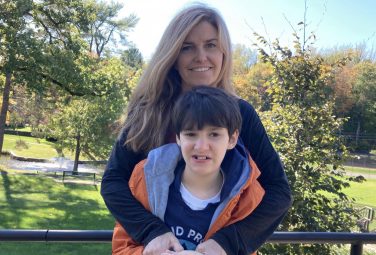‘Band of Mothers’ Connect to Raise Awareness About Boys With Rett
Written by |

Kate Ferdinandsen and her son Colin. (Photo courtesy of Kate Ferdinandsen)
Of the people who know about Rett syndrome, many think it affects only females. But families of boys with this disorder know differently.
Parents of children with an ultra-rare manifestation of this already rare and little-known disease find each other online and grow close in this corner of the Rett community. Worldwide, more than 60 boys have been diagnosed with Rett since its causative gene, MECP2, was identified in 1999.
The disease is estimated to affect one in every 10,000 to 15,000 live births, and is typically treated only in girls because Rett is largely thought to kill boys in infancy. This is because the MECP2 gene, a regulator of other genes and believed through its protein to affect brain and neuronal function, is on the X chromosome. Females inherit two X chromosomes, one from each parent, and mutations in one chromosome’s gene copy can be compensated by a healthy other copy.
Boys don’t have a backup copy of the MECP2 gene. They inherit one X chromosome (and its genes) from their mother and a Y chromosome from their father. For this reason, Rett-causing mutations lead to severe disease in baby boys that can quickly turn deadly.
However, unusual inheritance in rare instances can allow some boys with Rett to survive into adolescence or adulthood.
Parents who had been told their boy was a Rett syndrome exception, and likely the lone one, were surprised to discover on social media others similarly affected.

Kate Ferdinandsen and her son Colin. (Photo courtesy of Kate Ferdinandsen)
Mary Engel, 45, and Kate Ferdinandsen, 51, connected with each other around 2017 through the Facebook page, Boys With Rett Syndrome Support and Education.
“I’ve encountered more boys that resemble Colin in recent years than when we first found out six years ago,” Ferdinandsen told Rett Syndrome News in a Zoom interview from her New York state home. “Every one of us thought we were the only one, or one of a handful.”
Engel calls the Facebook page a place where parents “can come talk without being scared or overwhelmed or wondering what might be coming next,” she said in a phone interview from her London home.
Doctors initially diagnosed, Colin, now 12 years old, with autism spectrum disorder when he was 3 because he had trouble communicating. But he also was unusually fatigued and unable to hold things in his hands, Ferdinandsen said.
Frustrated at being unable to express himself, Colin would hit himself in the head. He was diagnosed with Rett syndrome when he was 6.
Part of the difficulty diagnosing Rett early in life is that its symptoms can vary widely, and typically start anywhere between 6 and 18 months old. Between the ages of 1 and 4 the disease progresses, then a plateau is reached and symptoms stabilize for years or decades. Further muscle weakeness and loss of mobility generally characterize its final stage.
Engel’s son Henry, 5, was diagnosed about three years ago after a similar odyssey.
Henry went through a multitude of tests and specialists until a new genetic test finally confirmed he had Rett, days before his second birthday.
Both mothers were shocked by what they found online following the diagnosis. Ferdinandsen recalled reading an article that said males with Rett would not survive.
“Google is not your friend because everything says your kid has zero survival rate,” she said. “That’s one of the things that a lot of us parents band together and rally against … we’ve all been there, and we all have sort of similar stories as different as our boys and men are.”
One way Ferdinandsen found other families was “lurking” through online forums, trying to match symptoms she had read about with what she was experiencing with Colin. She also would directly ask: “Have you heard of any males?”
“To be told that it was just a spontaneous, random-ish thing that came up. I couldn’t wrap my mind around that,” Ferdinandsen said.
Other families were on similar fact-finding missions, and a male Rett syndrome community began to grow.
“I wanted to reach out to other parents so they wouldn’t have to feel the way I felt in the beginning,” she added.
As time went on, it became apparent that there were more boys and men with Rett than thought.
Ferdinandsen joined the Facebook group, now with around 280 members, shortly after it started in 2017. She learned of men — from adolescents up to middle-age — living with Rett. Connecting with others gave her hope that Colin’s life was far from over.
Colin today uses eye gaze technology to communicate with people around him. Because his disease is due to mosaicism, or a mixing of two different cell populations, some of his cells have healthy copies of the MECP2 gene, and he has been free of seizures.

Henry Engel. (Photo courtesy of Mary Engel)
“Our experiences are all a bit different, but generally, they understand how we’re feeling, what we’re going through,” Engel said of the Facebook community.
For Ferdinandsen, the group is a treasured source of information on how to care for Colin. Parents share what they learned caring for their own sons.
One of Engel’s goals in the community is making doctors more aware that Rett syndrome can occur in males. Greater awareness will lead to more diagnoses and more leverage for families affected by Rett.
“It means that they’ll also take us more seriously when it comes to clinical trials and keep the males in mind for future treatments,” Engel said, noting that another goal is ensuring that males with the disease are not forgotten in drug development.
Available treatments for Rett manage disease symptoms, but do not address its underlying causes. Still, research has progressed at a rapid pace since the MECP2 gene’s discovery by Huda Zoghbi, now the director of the Jan and Dan Duncan Neurological Research Institute at Texas Children’s Hospital.
Zoghbi is using Henry’s cells to understand the disease, his mother said. She is reported to have bred mice with his mutation to experiment with treatments that might improve the expression (activity) of this gene and the MeCP2 protein it’s responsible for producing.
Not all of Henry’s cells lack MeCP2 — which is essential for brain health — because of a rare mutation scientists are trying to understand, Henry’s father, Richard Engel, NBC News’ chief foreign correspondent, said in a “Today” show segment he produced about his family and Zoghbi’s work.
Multiple rounds of genetic testing on Colin, Ferdinandsen said, showed that about a quarter of his cells are affected by Rett syndrome. His mosaicism has spared most of his cells, and his symptoms also aren’t as severe as in other boys,
Her goal, shared by many in this corner of the Rett community, is making sure that when trials for potential treatments open, boys and men with this disease aren’t forgotten or overlooked.
“As medications come out to alleviate some of the worst symptoms of Rett, I want to make sure our boys are not back-burnered with insurance companies or medical systems,” Ferdinandsen said.
Caring for a child with Rett is not easy and every day is a fight for a cure, Richard Engel wrote in a 2019 essay about his son. But there are still plenty of moments of happiness, like when Henry called him “dada” for the first time.
“Having a special needs child makes you savor the patches of sunshine you cross on the hard, and often lonely, road toward a cure: the doctor’s visits that don’t go as badly as expected, a solid night’s sleep, or a Dada three and a half years in the making,” Engel wrote.





